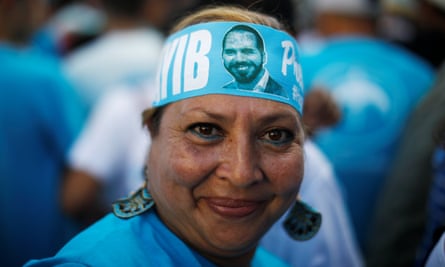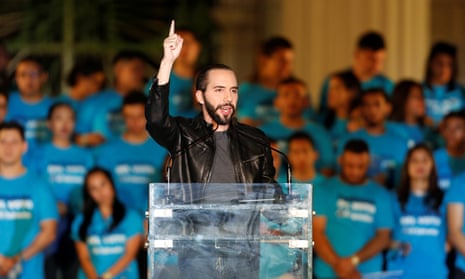“Corruption is the plague that infests our country,” said Omar Garcia, a 37-year-old janitor from El Salvador’s capital San Salvador, reflecting the primary concern of much of the electorate ahead of Sunday’s presidential election.
A series of corruption scandals have left Salvadorans fed up with leaders who have pillaged government coffers for their own benefit while the country struggles to address the widespread inequality, unemployment, and insecurity that has led to mass emigration.
The favourite to win is Nayib Bukele, a 37-year-old former businessman and mayor of San Salvador, formerly of the ruling leftwing FMLN party. He has stood on an anti-graft platform and campaigned on the slogan: “There’s enough money when no one steals.”

Since at least 2015, an anti-corruption wave, exposing and prosecuting politicians who enjoyed impunity for decades, has swept Central America. It started with a peaceful citizen uprising in neighbouring Guatemala that brought thousands to the streets, forced the resignation of a now-imprisoned president, and swept supposed political outsider Jimmy Morales to the presidency.
“[Since then], there has been greater citizen awareness about the depth of the problem of corruption in the region, and also a desire for greater government accountability,” said Adriana Beltrán, director for citizen security at the US-based research organisation Washington Office on Latin America.
In El Salvador, the FMLN and the rightwing Arena party have dominated politics since a peace accord in 1992 ended a 12-year civil war. But corruption scandals involving presidents from both parties has led to rising levels of discontent among voters. Three of El Salvador’s former presidents – two from Arena and one from the FMLN – are accused of embezzling more than $650m (£496) since 1999, an amount that equals roughly 2.6% of the small Central American nation’s GDP.
Many voters see Bukele as a “new possibility and a new voice for change”, amid widespread discontent over the inability of either main party to address the country’s challenges, including corruption, said Beltrán.
The FMLN and Arena candidates Hugo Martínez and Carlos Calleja have been unable to separate themselves from their party’s scandals and convince voters their promises to fight corruption are genuine. Bukele is the only candidate to openly back an international body to fight corruption in El Salvador, similar to one in Guatemala. Days before the election, newly revealed documents implicated Martinez directly in an embezzlement scandal during the presidency of Mauricio Funes. He denies any wrongdoing.

“We have had 20 years of Arena and 10 years of [the] FMLN and all they have done is rob the country,” said 43-year-old Vanessa Peña, a Bukele supporter .
Still, some voters are sceptical that Bukele’s anti-corruption talk will amount to more thanjust an empty campaign promise. Guatemala’s anti-corruption candidate has proven to be flawed. Since taking office, Morales has been implicated in a corruption scandal and has thrust the country into a constitutional crisis.
“He’s the same,” Otoniel, a 34-year-old government employee who asked to be identified only by his first name, said of Bukele. “No one here believes politicians anymore.”
Bukele has also been at the centre of scandals. As mayor, he was accused of gender violence against an employee after throwing an apple at her and calling her a “witch”, in a case that led to his ousting from the FMLN. He denies the incident ever occurred. In July 2018, Bukele joined centre-right party Gana in a move some voters criticised as opportunist given his history as a leftwing politician.
“Hopefully we don’t fail with the decision that we make as a people,” Garcia, the janitor said. “I don’t want any more corruption.”
